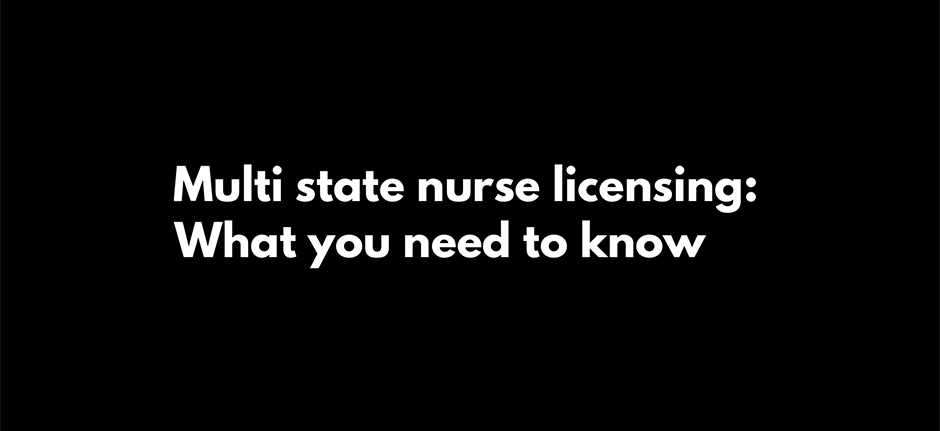As the U.S. continues to grapple with a nursing shortage, many nurses are starting to work across state lines, including travel nurses and those looking for new career opportunities. This comes as the baby boomers are starting to retire and the demand for healthcare services continues to skyrocket around the country. The Bureau of Labor Statistics projects the need for an additional 203,700 new RNs each year through 2026 to fill newly created positions and to replace retiring nurses.
With so many positions to fill, working across state lines will help you expand your options as a registered nurse, but you’ll need to get licensed in multiple states. Navigating each state’s licensing requirements can be daunting to say the least, especially if you’re already working full time at a hospital. Use this guide to get licensed in more than one state.
The Nursing Licensure Compact Gets an Upgrade
The National Council of State Boards of Nursing (NCSBN) created the Nursing Licensure Compact (NLC) back in 2000, which is an agreement between participating states that allows nurses holding a license in one state to practice in all states participating in the program. In 2017, the NCSBN updated the compact and created the Enhanced Nursing Licensure Compact (eNLC), which includes standards for licensing that the previous compact lacked, including newly added criminal background checks.
Some states remain hesitant to join the compact, citing concerns over the requirements for licensure, patient privacy, loss of state revenue due to a lack of licensing fees, and the growth of telehealth, but the program was initially created with the intent of including all 50 states.
States currently participating in the eNLC include:
- Alabama (Starting Date: TBD)
- Arizona
- Arkansas
- Colorado
- Delaware
- Florida
- Georgia
- Idaho
- Indiana (Starting: 1/1/2020)
- Iowa
- Kansas
- Kentucky
- Louisiana (Registered Nurse and Practical Nurse)
- Maine
- Maryland
- Mississippi
- Missouri
- Montana
- Nebraska
- New Hampshire
- New Mexico
- North Carolina
- North Dakota
- Oklahoma
- South Carolina
- South Dakota
- Tennessee
- Texas
- Utah
- Virginia
- West Virginia (Registered Nurse and Practical Nurse)
- Wisconsin
- Wyoming
States with pending eNLC legislation include:
- Massachusetts
- Michigan
- New Jersey
- Pennsylvania
eNLC Licensing Requirements:
Once you meet the following licensing requirements, you’ll be free to practice in any state participating in the compact without having to pay any additional licensing fees. To join the program, you must:
- meet the requirements for licensure in your state of residency
- have graduated from a board-approved education program OR graduated from an international education program (approved by the authorized accrediting body in the applicable country and verified by an independent credentials review agency)
- have passed an English proficiency exam (applies to graduates of an international education program not taught English or if English is not the individual’s native language)
- have passed the NCLEX-RN or NCLEX-PN examination or predecessor exam
- be eligible for or hold an active, unencumbered license
- submit to state and federal fingerprint-based criminal background checks
- have no state or federal felony convictions
- have no misdemeanor convictions related to the practice of nursing
- not currently be participating in an alternative program (nurses are required to self-disclose current participation in an alternative program)
- have a valid United States social security number.
You need to claim primary residency in an eNLC participating state in order to apply for a compact nursing license. Primary residency means the state where you vote, file your taxes, or have a driver’s license.
If you live in a non-eNLC participating state, you can apply for a license by endorsement, but you’ll be issued a single-state license instead of a compact license, which means you’re not free to participate in the program. In this case, you’ll have to apply for multiple single-state licenses if you want to practice in more than one state.
Going Through the Process
If you’re confused, you’re not alone. Making sense of multistate licensing isn’t always easy. We’ll walk you through a few examples of how this process can play out.
1. You live in an eNLC participating state and you want to practice in another eNLC participating state.
You’ll need to apply for multistate compact license by meeting the requirements listed above. Once you’ve been approved, you can practice in any state participating in the program without having to obtain another license. You’ll need to complete a criminal background check and fingerprinting for the eNLC participating state you want to practice in. Once you pass, you can begin work immediately.
2. You live in an eNLC participating state or a non-eNLC participating state and you want to practice in a non-eNLC participating state.
You’ll need to apply for a single-state license in the state that you want to practice in, pay any additional licensing fees, and pass a criminal background check and submit to fingerprinting. This state may have different licensing requirements than your current state of licensure, so you’ll need to do your research ahead of time. Once you receive your single-state license, you can start work for your new employer.
The timeline for getting your compact or single-state license varies from state to state, so give yourself plenty of time to get approved before moving or accepting a job offer.
How to Apply for an eNLC License
If you want to upgrade your existing nursing license to an eNLC, go to your state board of nursing website and find the “Get a New License” option. You should see either a “Get an eNLC License” or a “Get a Multistate License” option. If you meet the requirements, you’ll need to provide a mailing address or a proof of address. Then, you’ll need to complete the criminal background check and get fingerprinted at an approved center in your home state. You may need to pay a fee for the background check or fingerprinting, depending on the state.
It could take several days or weeks for your application to get approved. The license will then be mailed to the address you provided. If you are a member of the original NLC, you will automatically qualify for the eNLC, so you won’t have to apply for another multistate license.
Once you follow these steps, you’re ready to practice in any eNLC participating state. Explore new opportunities and take your nursing career to the next level!



